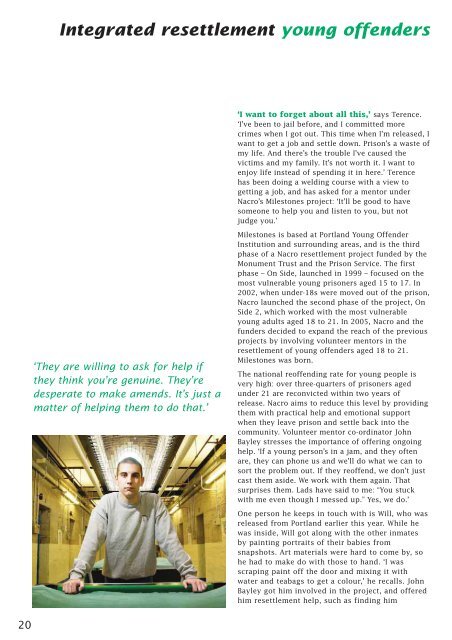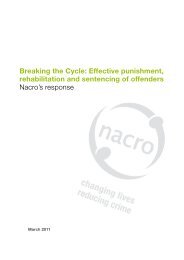Nacro annual review
Nacro annual review
Nacro annual review
- No tags were found...
You also want an ePaper? Increase the reach of your titles
YUMPU automatically turns print PDFs into web optimized ePapers that Google loves.
Integrated resettlement young offenders‘I want to forget about all this,’ says Terence.‘I’ve been to jail before, and I committed morecrimes when I got out. This time when I’m released, Iwant to get a job and settle down. Prison’s a waste ofmy life. And there’s the trouble I’ve caused thevictims and my family. It’s not worth it. I want toenjoy life instead of spending it in here.’ Terencehas been doing a welding course with a view togetting a job, and has asked for a mentor under<strong>Nacro</strong>’s Milestones project: ‘It’ll be good to havesomeone to help you and listen to you, but notjudge you.’‘They are willing to ask for help ifthey think you’re genuine. They’redesperate to make amends. It’s just amatter of helping them to do that.’Milestones is based at Portland Young OffenderInstitution and surrounding areas, and is the thirdphase of a <strong>Nacro</strong> resettlement project funded by theMonument Trust and the Prison Service. The firstphase – On Side, launched in 1999 – focused on themost vulnerable young prisoners aged 15 to 17. In2002, when under-18s were moved out of the prison,<strong>Nacro</strong> launched the second phase of the project, OnSide 2, which worked with the most vulnerableyoung adults aged 18 to 21. In 2005, <strong>Nacro</strong> and thefunders decided to expand the reach of the previousprojects by involving volunteer mentors in theresettlement of young offenders aged 18 to 21.Milestones was born.The national reoffending rate for young people isvery high: over three-quarters of prisoners agedunder 21 are reconvicted within two years ofrelease. <strong>Nacro</strong> aims to reduce this level by providingthem with practical help and emotional supportwhen they leave prison and settle back into thecommunity. Volunteer mentor co-ordinator JohnBayley stresses the importance of offering ongoinghelp. ‘If a young person’s in a jam, and they oftenare, they can phone us and we’ll do what we can tosort the problem out. If they reoffend, we don’t justcast them aside. We work with them again. Thatsurprises them. Lads have said to me: “You stuckwith me even though I messed up.” Yes, we do.’One person he keeps in touch with is Will, who wasreleased from Portland earlier this year. While hewas inside, Will got along with the other inmatesby painting portraits of their babies fromsnapshots. Art materials were hard to come by, sohe had to make do with those to hand. ‘I wasscraping paint off the door and mixing it withwater and teabags to get a colour,’ he recalls. JohnBayley got him involved in the project, and offeredhim resettlement help, such as finding him20
















